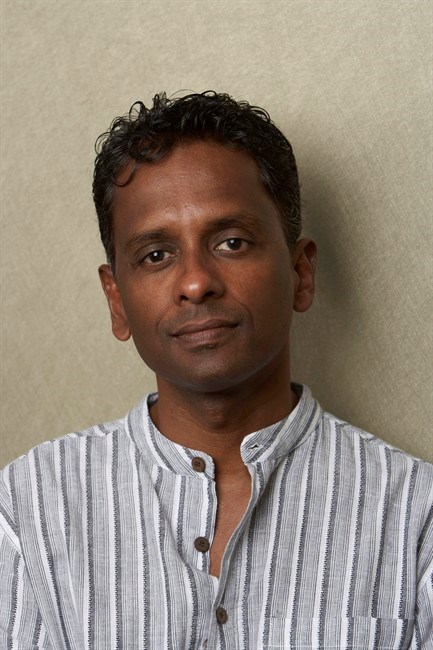TORONTO - Shyam Selvadurai begins each new novel by deciding where his characters will live.
"The first thing I need to do when I'm writing a novel is figure out the houses," says the 48-year-old writer, who lives in Toronto. Sometimes he'll wander the streets looking for the perfect home or base his description on a friend's apartment.
"Unless I have that particularity, I can't write it. But once I've got those down, then I'm OK."
His new novel, "The Hungry Ghosts" (Doubleday Canada, $29.99), reflects Selvadurai's interest in how where we live shapes who we are.
Selvadurai was born in Colombo, Sri Lanka, and immigrated to Canada with his family at age 19. He is the author of two acclaimed works of fiction, "Funny Boy" (1994) and "Cinnamon Gardens" (1998), and a young adult novel, "Swimming in the Monsoon Sea" (2005).
"The Hungry Ghosts," a haunting story of longing, family ties and forgiveness, begins in Canada. Shivan, a gay man of mixed Tamil and Sinhalese ancestry, is preparing to visit his dying grandmother in Sri Lanka.
Compelling flashbacks tell the story of Shivan's childhood in his domineering grandmother's home, his immigration to Toronto with his mother Hema and sister Renu, and his adult life in Vancouver.
Interwoven into the narrative are the Buddhist tales of hungry ghosts — "perethi" — told to Shivan by his grandmother. Such ghosts are doomed to remain hungry and unsatisfied because of what they desired in their past lives.
But the living can free the dead from this fate by performing good deeds, as Shivan's grandmother Daya continually reminds him. She sees herself as one of these ghosts and Shivan as her saviour.
Selvadurai was careful to engage with these stories as literature. "I thought they were so real, so sensible," he says. "I didn't want to include them in a kind of cutesy, ethnographic way."
Daya, a powerful but frustrating character who builds her family's fortune in real estate, was supposed to be part of the novel's back story, but "from the moment I saw her sitting on that bed polishing those ornaments, she was integral to the story," says Selvadurai. "She just took over in a way."
She is based on Selvadurai's memories of rural Sri Lankan relatives who married into the Colombo gentry and moved to the city.
"These women coming from a rural background had a more robust idea of womanhood (than the Colombo women), which was that you did participate in business and you had an equal stake in the household," Selvadurai says.
He thinks that Sri Lankans of his generation will recognize aspects of their own grandmothers in Daya. "We loved them, but we also feared them," he remembers.
Shivan convinces his mother and sister to immigrate to Canada to escape his grandmother, although his mixed ancestry also presents a compelling reason to leave, given the 1983 anti-Tamil attacks in Colombo.
The novel touches on these riots, territory Selvadurai also covered in "Funny Boy." This time, he didn't want to dwell on the unrest.
"I have this belief that politics to fiction is like salt in food," he says. "When you don't have any of it, it tastes bland; when you have too much of it, it's unpalatable."
Instead, "The Hungry Ghosts" documents Shivan's difficulty adjusting to Canada. Selvadurai also struggled to adapt when he arrived here as a teenager.
"Most people who come to Canada, whether as economic immigrants or refugees, are coming from circumstances in their country which are forcing them to leave," he says. "The whole idea of migration and dislocation is a very traumatic experience.
"If you don't actually acknowledge the trauma, you can't get past it."
Although the novel isn't autobiographical, Selvadurai says "The Hungry Ghosts" is his most personal novel yet.
"It's very viscerally me in a way. People assume that when you're writing about yourself in that raw, visceral way, it has to be memoir, but fiction is a better medium for me.
"From my point of view it's a truer portrait."
Readers have certainly responded to Selvadurai's honest, touching work. His first novel won the Lambda Literary Award and the Smithbooks/Books in Canada First Novel Award. "Cinnamon Gardens" and "Swimming in the Monsoon Sea" were shortlisted for a number of prizes.
He dealt with the expectations for his third novel by turning to Buddhist philosophy. "One acknowledges it, one leans into the fear and then moves through the fear," he says.
"You can put it in its place and know what you need to do, which is write the novel." He laughs. "That's just the way it is, so you just kind of deal with it."
Nevertheless, writing "The Hungry Ghosts" was difficult.
"I knew I had to write it, because it was essential for me to write it," Selvadurai says.
"Either I wrote that book or I didn't write at all."



